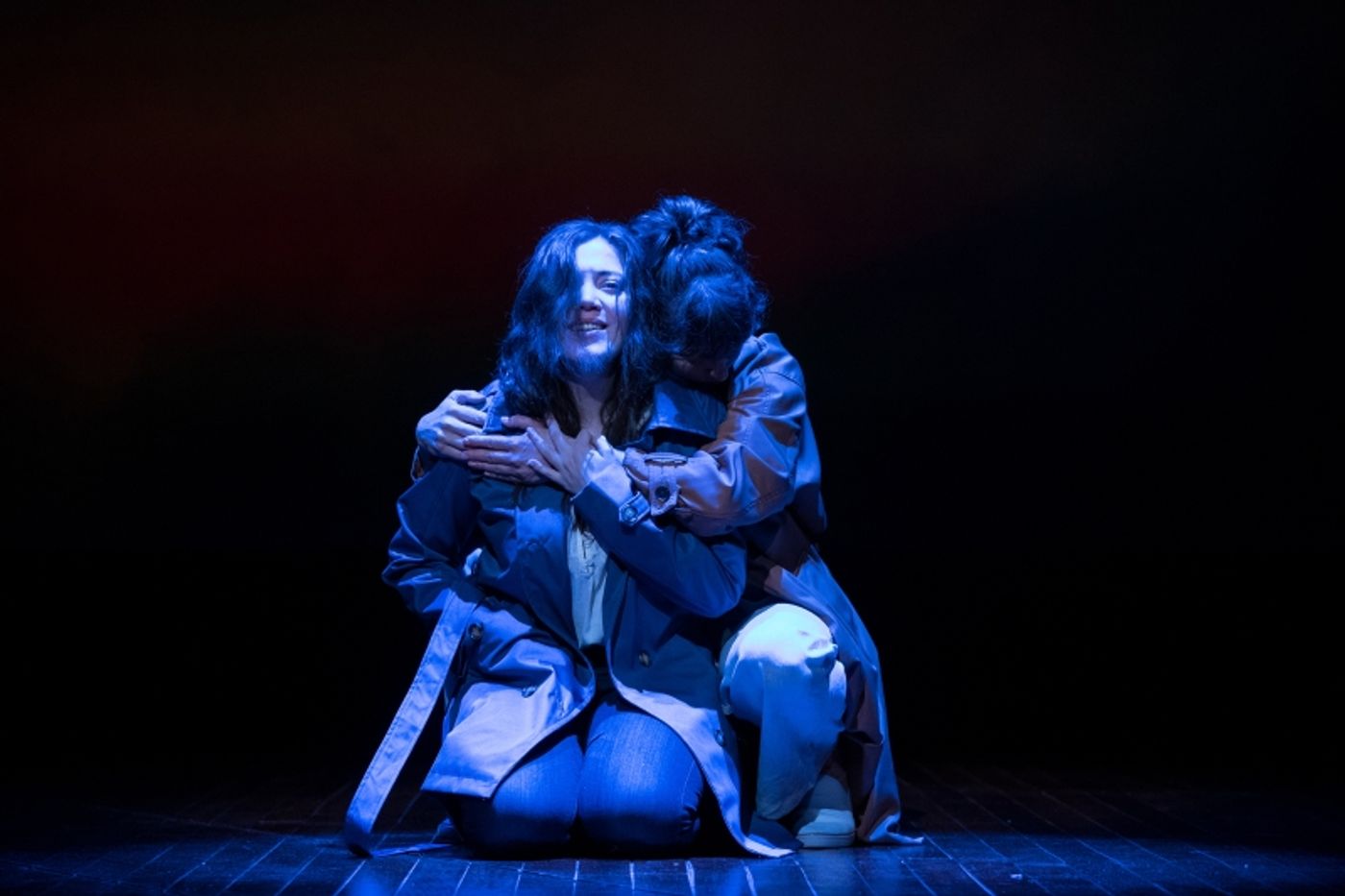Review: Deeply Powerful CLEAN / ESPEJOS Wrings Out Emotional Catharsis at South Coast Rep
Christine Quintana's searing bilingual drama offers healing for a pair of women suffering from trauma.
Now on stage through April 10, 2022 at OC's Tony Award-winning South Coast Repertory in Costa Mesa, Christine Quintana's searing, bilingual two-character play CLEAN / ESPEJOS is a riveting drama showcasing a pair of vulnerable women who each come from very diverse backgrounds, economic levels, and, most significantly, native languages. While their individual experiences couldn't be any more different, they do both share the rather arduous common goal of trying to get past their respective prior traumas that have shaped who they are and have continued to haunt them as adults.
Through successive, emotionally-delivered personal monologues, the play's two spectacular actors slowly peel away at their respective characters' dense layers via narrated speeches uttered in their own native language, which are also simultaneously accompanied by translations projected on panels and walls that move behind them.
Speaking their supposed truths directly to the audience---in the language each woman is more naturally apt to use in their own daily lives---we are given direct access to their actual thoughts and feelings, perhaps tragically unfiltered or perhaps maybe rather carefully curated. But more importantly, their divergent languages signal that there is a shared commonality to the experience of trauma, particularly for women who can recognize the visual signs amongst each other even without the use of actual words.
The play's own bilingual title offers multiple translations itself: the word clean, on the surface, may refer to one character's occupation, someone who "makes clean what [others make] dirty." The word could also mean another character's manifesto in dealing with this weekend's "vacation" activities. Additionally, it could also reference what needs to occur in order to, maybe, lead a not-so-messy life.
Meanwhile, the word espejos translates to "mirrors," which could refer to the reflected mirror-like correlation between both women's struggles. It could also, perhaps, reference the shattered reflections of their true selves whose shards need to be pieced back together to make them whole again.
While most theatergoers will probably balk at the thought of having to do some speed-reading with their live theater experience---something that most of us, including myself, solely expect only in movies or TV shows---the use of open-captioned supertitles here quickly becomes less of a cumbersome activity and more of a narrative necessity in facilitating a full appreciation of each character's journey. In another sense, witnessing the two characters' misunderstanding offers us,, as observers, the ability to decipher the miscommunication.
Not being a Spanish language speaker myself, the translated subtitles provided easier understanding for the character of Adriana---played beautifully in the play by Lorena Martinez---to express her melancholy and yearnings in her own native tongue for our direct consumption.
We soon learn that Adriana works as the often harried, remarkably patient cleaning staff manager of the "paradise"-like Cancún resort which provides the setting for the play. Direct narration and context clues reveal that it is a job she hopes could lead to even better, upward-moving prospects---a suitable and rewarding end-goal for someone who sacrificed a personal relationship with a guy and a quieter, small town life with her family in order to be a cog in an industry that provides foreign artificial turf for visitors that wouldn't know what the real Mexico is like from a theme park simulation.
In a way, Adriana becomes a defacto spokesperson for an entire workforce that is specifically tasked as a profession to not be seen or heard, yet whose behind-the-scenes impact contributes greatly to the overall experience to be enjoyed by those who have the means to pay to stay and play at the resort itself. In other words, she gives voice to the voiceless---those whose often unappreciated work and bountifully-dispensed smiles and subservient salutations are perpetually provided in an effort to make the customers' experience pleasurable.
As a specific individual, though, Adriana, more than anything else provides another tale of early scarring from trauma that, despite coming from a different geographical locale and culture, is still quite relatable (I will dare not spoil the revelation here, as it is too important for the trajectory of the play). Still haunted by this trauma---recently triggered by some tragic news from home---Adriana attempts to stifle her emotions for most of the play.
Thanks to her first-person insight, we become privy to how she goes about dealing with these personal scars, but also how she feels about and how she handles some of the more entitled guests she encounters at her job...
Enter Canadian tourist and resort guest Sarah (Nell Geisslinger), a visible mess of a woman who crosses paths with Adriana on multiple vulnerable occasions. Strong-armed into fulfilling the role of maid-of-honor for her much younger sister's destination wedding, she literally and figuratively stumbles along her visit lost in a haze of self-loathing and alcoholic beverages. A not-so-quintessential but still identifiable "Karen," she expectedly displays typical "bad American" behavior---a cringe-worthy mixed bag of cultural ignorance, an unwarranted Western superiority/savior complex, and, well, just abject embarrassment.
Like Adriana, Sarah, too, suffers from her own deep trauma, and it's not a stretch to conclude that this trauma is at the root of her now visible odd behavior (and, like, Adriana's, I won't dare spoil her revelation either). A walking trope of those white ladies most often caught doing/saying dumb things on social media, Sarah is trying her best to just get through the week without causing her and her family any embarrassment. Alas, things aren't going so successfully.
Her first encounter with Adriana is an understandably awkward one for both: with resort staff refusing to deal with her mess (and it is, a spoiler-warning for the squeamish, a gross one), difficult guest Sarah meets level-headed head of housekeeping Adriana in a meeting that was destined to happen. Their exchange---with Adriana accommodating the guest by speaking in English---is as uncomfortable for them as it is for the audience.
For her part, Adriana tries to ease Sarah's embarrassment by addressing the situation with the clinical objectiveness of a first-responder trained to rectify such scenes. Instantly recognizing Sarah's shame and vulnerability (and not quite knowing at first the true nature of what happened to her), Adriana offers the hysterical guest genuine sympathy and kindness---while concealing her true judgment to herself, of course. After all, as she reminds us all, it's part of her job to be (overly) nice to the guests.
Like Adriana, Sarah also has her own deeply buried trauma. But rather than use it as a catalyst for self-improvement the way Adriana is attempting to do, Sarah's trauma manifests in, well, less ideal outward behavior.
And as the play progresses, in their own ways, they mutually identify the existence of something troubling between each other spread out among their initial brief encounters.
On one stormy night, in what was supposed to be a moment for Adriana to temporarily shed some of her long-held inhibitions (a guise she dons as a part of her upward-ascending path) during an impromptu company party, she finds herself in a situation of vulnerability that causes her to have an emotional outburst. This rain-soaked outburst, however, is witnessed with erroneous context by the well-meaning Sarah, who takes it upon herself to come to her aid.
As the two women come together in mutual (mis)understanding punctuated by a cultural and language barrier, both---in an interesting twist---use this newly-formed bond as a motivational wake-up call, so to speak, to face their respective traumas head-on, setting both on a path for, what we all hope, can be the start of their healing process.
What started as an online-streamed SCR reading at last year's 2021 Pacific Playwrights' Festival, the now fully-staged production---directed with admirable flow by Lisa Portes and featuring Spanish translations by Paula Zelaya Cervantes---is a moving and poetic drama about what some individuals do to overcome the scars of the past, regardless of economic or cultural backgrounds. Perhaps it might be these pointed differences in environments that allow one to see better beyond the blinding shields one imposes to bury such traumas.
The well-timed translations---emblazoned on top of Brian Sidney Bembridge's effectively minimalist set and Yet Run Nam's projected backdrops, that are both bathed in Karyn D. Lawrence's striking lighting design---are easy to follow while still allowing us to glance down to see the emotions on the actor's faces as they say them. There is a mood of eavesdropping intimacy in the production that worked really well with the story.
Returning to the roles they first played in the SCR reading, Martinez and Geisslinger are both engaging in their roles as Adriana and Sarah, respectively. Each actor orates their own monologues with discernible gravitas and, at times, self-effacing humor. Martinez is especially strong in providing underlying subtext to her delivery, while Geisslinger's manic and irrational outbursts are spot-on for what we can easily glean from her character. As a play that mostly relies on first-person perspectives, these two terrific actors sold it for me.
Thanks to their performances, CLEAN / ESPEJOS reiterates vividly the idea that detecting and overcoming trauma transcends beyond understood language, and that language alone may not always properly convey truthful context and nuance to one's true feelings.
* Follow this reviewer on Twitter: @cre8iveMLQ *
-----
Photos by Jenny Graham for South Coast Repertory.
Performances of Christine Quintana's CLEAN / ESPEJOS, directed by Lisa Portes continue at South Coast Repertory through April 10, 2022. Tickets can be purchased online at www.scr.org, by phone at (714) 708-5555 or by visiting the box office at 655 Town Center Drive in Costa Mesa.
***
Reader Reviews
Videos






